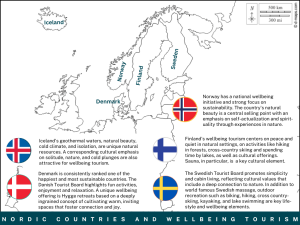Additional Terms
Additional Terms
Chakras
Nordic Wellbeing Tourism
Wellbeing tourism is both a geographical and conceptual designation as it is strongly associated with Nordic countries. That is, reflects the region’s traditions and cultural preferences, setting Nordic wellbeing tourism apart from other forms of wellness tourism offered in Europe. For example, Alpine wellness tourism, focused on relaxation and health in mountain regions like the Swiss, Austrian, Italian, French, and Bavarian Alps, emphasizes luxury and pampering, whereas Nordic wellbeing tourism is more centered on simplicity and nature.
The rise of wellbeing tourism reflects a deep cultural connection to well-being in Northern Europe, where nature plays a central role. A key concept in Nordic wellbeing tourism is friluftsliv, a Scandinavian philosophy of outdoor life and connection with nature. The Nordic countries enjoy traditional activities like sauna bathing, cross-country skiing, and bathing in hot springs, which have been incorporated into wellbeing tourism. Rural areas, with their pristine natural environments and tranquility, attract tourists seeking clean air, vast open spaces, and local culture. Activities often focus on nature’s restorative qualities, including water sports, hiking, cycling, and forest bathing. Wellbeing tourism also encourages engaging with locally sourced food, cultural traditions, and heritage, all contributing to a serene and restorative experience.
Nordic values such as sustainability, environmental awareness, and a balanced lifestyle are also central, as is the historical link between the Nordic welfare state and wellbeing tourism. In Nordic countries, wellbeing tourism offers a holistic approach, as the interconnectedness of personal and planetary well-being are widely recognized. This form of tourism is thus considered inherently sustainable, as true personal well-being cannot be achieved without considering the social and ecological environments. It also demands responsible tourism practices that nurture both individual and collective well-being, while also promoting positive societal change and contributing to a more sustainable, equitable world. The welfare state’s focus on healthcare and subsidized holidays has fostered a culture that values health and wellbeing.
An overview of the Nordic countries is included below:


